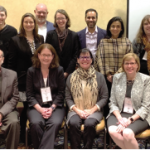To ensure programs are infused with the best faculty educators, support at the institutional & national level is needed.
The first three Foundation CSE Awards were granted in July 1999. Since then, between two and three educators have been granted the award yearly. Many projects have resulted in enduring materials that are used nationally, such as Rheum2Learn, Rheum4Science, USSONAR and the Hospital for Special Surgery’s Critical Literature Assessment Skills Support—Rheumatology (HSS CLASS-Rheum).
One unexpected benefit of the CSE program has been the organic development of a community of educational scholars, who meet throughout the year and collaborate to support each other. These scholars play a role in activities that benefit the ACR and the rheumatology community, such as advocacy and updating the Milestones. The group continues to collaborate on research and teaching programs disseminated for use at local and national levels.
The Academy: Grant Programs to Support Educators’ Contributions
Academies have arisen to support educators and are varied in their missions and the amount of individual support granted. A 2008 survey sent to U.S. medical schools found less than 50% offer any monetary awards to scholars and only 8% offer protected time for research.4 Many have a long funding history and have shown outcomes that include not just innovative programs but career advancement for the CSE as well.
Conceptualizing a similar model at an institutional level, the HSS Academy of Rheumatology Medical Educators was founded in 2011 to support educators and ensure a home where their accomplishments would receive the same recognition as colleagues doing bench, clinical and translational research.
The HSS Academy’s pilot grant innovations funding program was designed “to serve as an impetus for the development of new teaching programs and to promote curricular change through the development of new or improved teaching programs and learning opportunities.”5
The program is unique in that nearly a million dollars was raised through directed fundraising by the academy director and designated specifically for annually awarded education grants. Grants were intended as an impetus to educators throughout the hospital to help improve educational programs broadly, not just to support those committed to educational research. Each grant application was assessed by nationally recognized educators, many of them previous Foundation CSE awardees with significant ongoing contributions to rheumatology education. Scores were assigned to each grant using Glassick’s criteria for education research. Applications that scored the highest were awarded up to $50,000 for one year. Those grants that demonstrated ongoing productivity were eligible for additional support.
Our survey of recipients of the initial pilot grant funding program found many noted benefits to their careers following the grant including increased recognition as an educator, time protected to pursue education research activities, teaching awards and subsequent promotions or other grants awarded. The number continuing to devote time to education research after completing their award was an impressive 70%.
Thereafter, the Academy made a commitment to continue supporting a core group of educators cultivated during the initial phase with a research assistant that allowed for continued productivity. This led to the creation of a core group of institutional educators who continue to produce high quality scholarship and innovative program development.
The formation of the education research funding pilot highlights the talents of previously unsupported and unrecognized teaching faculty by allowing them to distinguish themselves at home professionally and academically. This underscores the clear advantages of an institutional structure to foster the CSE professional identity and simultaneously achieve the hospital’s heightened educational goals.


